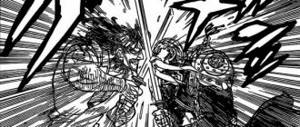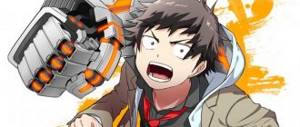What will our world be like in a hundred years? A thousand years? A million years? This question has always excited people's imaginations. Books are written about the future, films are made, and hundreds of possible theories are constructed. Some of them are similar to the truth, some are on the verge of fantasy, but they all have the right to exist, because if you told a person of the 19th century that in a hundred years people will be surfing the endless expanses of space and virtual networks (with the second, success so far they will be better), you would be mistaken for a madman. It is difficult to talk about what society will be like in the future when sometimes we don’t even know what will happen to us tomorrow. Well, the more interesting it is to get acquainted with another original theory. This time I'll talk about anime Psycho–Pass (“Psycho-Pass”), which will tell you the story of the “ideal” society of the future.
Summary
According to the plot, scientists of the future are able to read with the highest accuracy the psychological state in which this or that person is at the moment; in this, the scientific community is helped by a computer program called “Sibyl”, which displays the results of a person’s scan in a psycho-pass. It is very easy to identify and distinguish emotions; a citizen’s passport instantly acquires one color or another after scanning. Light shades of the passport indicate that everything is fine with the person, but dark shades force law enforcement agencies to take immediate action, because such people have a too high crime rate, they can harm themselves or others. All subjects with a similar problem are first forced to undergo a course of treatment, but if this does not help, then the person is completely isolated from the rest of the world.
Plot
To be honest, the plot didn't impress me. No, the idea of regulating social order based on a person’s mental state is in itself very worthy (even if it has been used several times in films). I didn't like the way the most important plot details were presented. Instead of smoothly telling about the world of the future, the viewer is thrown into the thick of events from the very first episode, and is bombarded with unfamiliar characters about whom you don’t care yet, as if saying: “ Here’s action for you, here are heroes for you, and then... “You’ll figure it out yourself . The situation is made worse by the presence of naked cruelty - a typical feature of a controversial script, which without cruelty is not exciting enough. Screenwriters have to resort to shoddy techniques in order to somehow attract the viewer's attention. You don’t have to look far for similar examples - take Akame Ga Kill , Elfen Lied or Highschool of the Dead . In general, my first impression of the anime was twofold: the idea seemed interesting, but it was not presented in the best way.
However, from about the fourth episode the situation improves. The focus from the vague and uninteresting main storyline and mediocre main characters gradually shifts to secondary stories , which turn out to be high-quality and varied, and allow us to demonstrate in all its glory the rotten essence of the world of the future. The subplots are much more enjoyable than the main one, which is extremely rare. As a rule, you, on the contrary, wait for the endless branches to end so that you can finally see the continuation of the central story. In this regard, Psycho-Pass clearly stands out from the average anime.
We've talked about the advantages, now let's note the disadvantages. In addition to the dull main characters, the disadvantages I would include are the abundance of pretentious dialogues, which could have been completely avoided, as well as the presence of stupid scenes used solely to build up the atmosphere. I won’t talk about pretentious dialogues, of which there really are a lot in anime (especially performed by Kogami), but I will still say a few words about stupid scenes. Sometimes the characters behave not like detectives, but like stupid idiots, and make mistakes that are not typical for detectives. This is nothing more than plot manipulations used at the will of the screenwriters to introduce dramatic situations into the storyline that you simply do not believe in because of their illogicality:
- And let's go to a place without any further plans, where there is no connection, so that later one of the characters will die in front of the other!
- Let's split up in an unfamiliar building filled with enemies with weapons so that the other character dies heroically!
- And let’s walk in a dangerous place, not looking at our feet, despite the fact that a second ago we almost stepped on a tripwire, so that then one hero would sacrifice himself in the name of another!
- Let me, like a stormtrooper, not hit a standing enemy from ten meters, and then get involved in an epic chase!
Well, you can’t, you can’t, in a psychological anime, where 80% of the success rests on the realism of the climactic moments, allow such illogicalities and nonsense, otherwise there is a possibility of completely destroying the atmosphere of what is happening. Instead of empathizing with the characters, the viewer will over and over again frown meticulously and wearily cover his face with his hand.
Public Security Bureau
The characters in Psycho-Pass are employees of a special Bureau that ensures public safety. It employs investigators and punishers (these are people whose crime rate is high, but they help do all the dirty work for the Bureau). Each employee of this organization has a kind of weapon - dominators; they can measure the criminality coefficients of suspects from a distance and open fire only when a person’s psycho-passport has a dark shade or if a potential criminal resists justice. The main characters boldly enter the battle for justice and public order in this anime. “Psycho-Pass”, the names of the characters of which are known to every connoisseur of the genre, is very popular.
Kogami Shinya
It's worth starting with a description of Kogami Shinya, he is a tall young brunette with a high crime rate. He is efficient, courageous, knows how to control his emotions, and works in the first team in the crime investigation department. He constantly works on himself and his physical form, is a good psychologist and analyst, has an extraordinary mind, but at the same time he is a potential criminal himself, as evidenced by his coefficient - two hundred and eighty (with a normal indicator of fifty). The fact is that in the past he worked as an investigator, but became an unwitting witness to the brutal murder of his friend. That's when his passport changed. But when he was offered treatment, he refused and gave the go-ahead to continue playing the role of punisher. His main goal is to find the one who killed his comrade. This is a very strong and serious person.
Psycho-Pass: Sinners of the System
Film 1. Crime and Punishment.
Tokyo, near future. Employees of the Public Security Bureau, Inspector Mika Shimozuki and her assistant, Guardian Nobushika Ginoza, receive information that a car has been spotted speeding on the streets of the city. Yasaka Izumi is in it, she is an employee of the Aomori Rehabilitation Center for Potential Criminals. Izumi acts there as a staff psychologist working with prisoners. Izumi's psycho-pass data indicates an extremely high level of criminal tendencies. This indicator is 218, which allows law enforcement officers to open fire to kill with service weapons (dominators). Shimozuki gives the order to set up barriers on the road. Together with Ginoza, they take out the Dominators. The car rushes straight towards the Security Bureau building and crashes into the fence. Izumi has difficulty getting out of the car. She begs the police not to shoot, hands them an information cube, but cannot hold it in her weakened hands. The cube falls on the asphalt and breaks. Izumi faints.
Shimozuki and her colleague Inspector Akane Tsunemori speak with Bureau analyst Shion Karanomori. She says that the criminal’s memory cube is so damaged that the technology at her disposal does not allow it to be restored. She provides information about the identity of the detainee. She is 27 years old, the functioning of her brain is complicated by taking narcotic drugs. It is not possible to find out what kind of drug this is; such drugs are not publicly available on the black market.
The head of the Bureau calls the inspectors. You must take the detainee back to Aomori tomorrow morning. How, should we extradite a person with such a high level? This is the agreement between us and Aomori. They have special jurisdiction that takes precedence even over us. Previously, this center was under the jurisdiction of the Ministry of Public Welfare, and then it became part of the system of the Ministry of Economy. Potential criminals in Aomori are busy with an important project. Tsunemori asks the question: can we then check the condition of the object itself? Okay, a corresponding request will be submitted to the ministry in this regard. The inspectors leave the management office. Tsunemori suggests that Shimozuki divide up the efforts: you go to Aomori, and I will investigate in Tokyo. Shimozuki is forced to agree.
Tsunemori sees off his colleagues - Shimozuki, Ginozu and guard Yayo Kunizuki - who are going to Aomori by helicopter. Izumi is with them.
A helicopter flies over the snow-capped mountain peaks. Shimozuki tells his colleagues: they have come so far because in Aomori they are mining rare earth metal ores used to build drones. Potential criminals involved in the mining process have full opportunity to contact each other, this is an integral element of the entire system of such rehabilitation. When the helicopter lands, Izumi becomes hysterical.
The arrivals are met by the Aomori leadership, led by manager Kyoko Shujigai. Next to her stands the chief supervisor of the center, Rodion Matsuki. Shujigai thanks the Bureau staff for their help. Shimozuki asks: what do you know about your psychologist’s drug addiction? Shujigai: We have so many people working for us that it is absolutely impossible to keep track of everyone. But we will definitely quarantine her. Shimozuki: But we would like to observe Izumi during our visit. Next to her will be at least one of our employees - the guard Kunizuki.
Matsuki talks to Ginoza: I am responsible here for the behavior of potential criminals. Ginoza: Are you Rodion like in “Crime and Punishment”? After all, I didn’t kill old women with an ax. Ginoza: are you also a potential criminal? Matsuki: here everyone can get their chance for rehabilitation. Matsuki points to Shimozuki: your inspector is so young that not an adult hound, but a small puppy can be under her command.
Shujigai tells visitors: all behavior of potential criminals is regulated by a special program “Sibyl”. This is done to ensure that the rehabilitation process takes place in the most effective way. We are all colleagues here. And personally, I try to take care of every potential criminal. Shimozuki: And yet, you don’t have complete information about Izumi. Can I talk to her patients?
Shimozuki talks to Izumi's patients, but they are unwilling to answer any of the questions she asks. The guards interrupt the interview: this will interfere with the rehabilitation process. Shimozuki expresses a desire to go down to the mine to talk with the workers. Shujigai refuses her this: we can bring them to you.
Shimozuki talks to Ginoza: this whole rehabilitation program is just an excuse. Something's wrong here. Ginoza warns his colleague about the danger of conducting a forced investigation in Aomori: these people have very great opportunities, they achieved almost instantaneous extradition of Izumi to them. We can be escorted out of here at any moment.
In Tokyo, Tsunemori investigates the origin of the car in which Izumi ended up. It turns out that the car was controlled by an autopilot. The car belongs to a certain Otaru Takeda. Apparently, the owner of the car wanted Izumi to fall into the hands of Bureau employees. Takeda worked for a pharmaceutical company, meaning he and Izumi were connected by medicine. The company where Takeda worked developed drugs used only in Aomori. Tsunemori and his assistant go to investigate Takeda's apartment. Karanomori warns his colleagues: all the camera footage of this house has been destroyed by someone, be careful, I have a bad feeling.
There is no one in Takeda's apartment. Apparently, the owner either fled or was kidnapped.
Shujigai informs Shimozuki that Izumi has escaped. The Aomori administration accuses Kunizuki of facilitating the escape, and she is taken into custody in connection with this. Kunizuki, through a secret communication channel, informs Shimozuki that she was set up, deliberately diverting her attention for the time necessary to organize Izumi’s escape.
Shujigai tells Shimozuki that she has already sent a search party to locate the fugitive. Shimozuki: And this squad consists of potential prisoners? Yes, because they are very familiar with the surroundings and will be able to quickly detect Izumi. Shimozuki says: I'm going to find Izumi myself. She has such a high level that I will shoot her on the spot, I have every right to do so.
Shimozuki and Ginoza get into the car and go in search of Izumi. Ginoza: We actually left Kunizuki hostage with them. Aren't you worried about her? Shimozuki: But she was able to hack their database. She says that Izumi was last seen northwest of Aomori. Ginoza: Then I can guess where she might be hiding. There is a large cemetery there.
Ginoza and Shimozuki explore the building in the cemetery. There they discover a small room equipped as a nursery. Izumi is here. There is a little boy with her. Shimozuki requests information about the child from Karanomori. She reports: the boy’s name is Takei Kukumori, he is five years old, he is the son of a potential criminal, the boy has no health problems. There is a note in the dossier: the mother’s pregnancy became known after she was delivered to Aomori. Since potential prisoners are prohibited from raising children, Takei's mother was a local psychologist. Two weeks ago they disappeared. Izumi asks Shimozuki to help the boy. She hands her the information cube, but it turns out to be blocked. Izumi's speech becomes incoherent, she can't really say anything.
Kunizuki informs Shimozuki: the search engines are already in the cemetery. Shimozuki invites Ginoza to hide the child, and she and Izumi leave the building, which the search engines are already approaching. Shimozuki points his weapon at the searchers: don't approach! However, the fire control system informs Shimozuki that the criminal threat level of potential criminals is low, and therefore the weapon's trigger is blocked. Izumi throws a smoke bomb at the searchers, and he and Shimozuki run away.
Matsuki discovers that Kunizuki is transmitting information to Shimozuki, and he disables the guardian's communication system. The girl is given an injection and loses consciousness. Matsuki reports the incident to Shujigai. What do we do now? They went beyond what was allowed, so you know what to do. Matsuki: yes, I’m a former hound, so I’ll do everything right.
Tsunemori reports to the leadership of the Bureau that she managed to find out: Otaru Takeda had a fiancee, her name was Nomuri Kukori, she was sent to Aomori, where she died in an accident. Izumi arrived in Tokyo, where she apparently made contact with Takeda, after which he disappeared. We need to find him and take his testimony.
Shimozuki and Izumi meet Ginozu with a boy. Shimozuki suggests that his colleague hide somewhere with the boy. Ginoza says that the connection with Kunizuki has been interrupted. They probably found out that she hacked their system. So it’s better for us not to contact each other for now.
Ginoza and the boy are hiding in a dungeon in a cemetery. They are discovered by one of the search engines. He demands that the boy be given to him: he is a pest! Ginoza confronts and defeats the would-be criminal.
Ginoza talks to the boy. Suddenly, Takeya's information cube unlocks. Ginoza sees Izumi's image. She says that crimes are being committed in Aomori and many people are dying. But those who kill them are not to blame: they themselves have been brainwashed, they are also victims. Shujigai uses special drugs and hypnotherapy. As a result, potential criminals enter a state of groupthink. And they are capable of making collective decisions. This allows you to manipulate their behavior. Potential criminals lose the habit of thinking for themselves; they are absolutely happy. But at the same time, a change in the state of their psycho-passports occurs, which criminals are very afraid of. And there is a side effect: in the group consciousness there is a desire to kill anyone who opposes who knows what Aomori's secret is. I don't know what the secret is yet, but it has something to do with what's hidden in the dungeon under Aomori. Takei is in danger. I took the drugs intended for him instead.
Ginoza and the boy meet Shimozuki and Izumi again. Shimozuki says that she will infiltrate the dungeon under Aomori. She instructs Ginoza to free Kunizuki.
Kunizuki lies tied up on the floor of the cell. A huge guard assigned to her is going to rape the girl. The door to the cell is knocked down by Ginoza, he incapacitates the guard and apologizes to his colleague for being late. Now we need to reconnect.
Karanomori informs Shimozuki that she has identified a high-ranking official - Akira Karasuma - who could influence Aomori's work. And on the day when the decision was made to return Izdumi to Aomori, it was Karasuma who came to the Bureau and met with its leadership.
Shimozuki descends into the dungeon under Aomori. There she discovers containers with radioactive waste. Shujigai enters the vault. Along with her are potential criminals in protective suits. Shimozuki: So that's Aomori's secret? In radioactive waste? Shujigai: yes. And potential criminals should not know about this secret. Shujigai activates an automatic system, the helmets of the potential prisoners' protective suits open, and they die from exposure to radiation. Shujigai: Their job was only to carry these containers. They can always be replaced by others; we have a lot of potential criminals. If a person is garbage, then there is no way to clean him up. Now give up. Shimozuki doesn't want to give up. She takes the elevator to the room where potential criminals are kept.
At the landing site where the police helicopter that brought the Bureau officers to Aomori is located, Ginoza is attacked by Matsuki. He controls a giant robot armed with chainsaws. During the fight, the robot pushes the helicopter off the tower on which the landing pad is located. Ginoza climbs onto the robot's head and disables the control system of this fighting machine. Matsuki gets out and the fight continues. Ginoza is victorious and pushes Matsuki off the tower.
Shujigai gives a speech to potential criminals. She says that their main enemy is Shimozuki. Because of it, the state of the psycho-passports of potential criminals inevitably worsens. But if you destroy Shimozuki, the psycho-passes will be in perfect condition. But Shimozuki shows the potential criminals a recording in which Shujigai calls them trash and says that their task is to carry containers with radioactive waste until their death.
At this moment, Kunizuki reports to Shimozuki that the communication system has been restored, and the Sibyl system is also working. Shimozuki points his gun at Shujigai. The Sibyl reports: the danger level is 421 points. Such an object must be destroyed. Shimozuki shoots Shujigai, killing her.
Potential criminals become terribly excited, they begin to fight with each other, rushing at Shimozuki. She runs towards the helipad, joined by Izumi and Kunizuki. The fugitives jump out to the helipad: it’s all over, the helicopter is not there. The girls and Ginoza, who has joined them, are going to shoot back at potential criminals. Engine noise is heard. Another helicopter flies to the site, on which Bureau employees evacuate their colleagues.
Shimozuki enters Karasuma's office. She accuses him of committing crimes on Aomori. Shimozuki points his weapon at Karasuma. The Sybil system tells her that the crime rate is 0, weapons are locked, and violence is prohibited. So you control Sibyl? Karasuma says that he is forced to do the dirty work. After times of chaos, the problem of reprocessing nuclear waste remained unresolved. If this is not dealt with immediately, then dangerous substances may fall into the wrong hands, including being exported abroad. Now do you understand that this kind of work needs to be continued? You will not disclose these details. Shimozuki: I agree, but only on one condition. Izumi and Takei must be ensured complete safety. Karasuma: I give you my word. Shimozuki: but you have to get something. She slaps Karasuma in the face.
Ginoza and Shimozuki discuss the news: Aomori was closed, potential criminals were transferred to other centers
Ginoza, Shimozuki and Takei visit Izumi at the hospital. They tell her that the boy has been placed in an orphanage for now. But after recovery, Izumi will be able to take Takei with him.
Film 2. The first guardian.
Foreign Ministry official Frederika Hanashiro comes to the office of the Public Security Bureau. She talks to Teppei's guardian Sugo. You don't fit into the bureau system. You are a retired military man, an ace pilot. I propose to join our ministry, and then all restrictions related to the state of your psycho-pass will be lifted.
Okinawa, 2112. A squad led by Captain Sugo sets up an ambush. The object of surveillance are two trucks. The target is successfully destroyed using combat drones. The training battle is over. Sugo and his team, including Yoshida Takaeshi, Itsuki Otomo, and his wife Rin, drink beer by the sea.
After the party, Sugou and Otomo discuss the psychological problems that arise when you have to kill people, even with a drone.
High-ranking inspectors, including Foreign Ministry official Mr. Fukiita, arrive at the military base. A secret operation codenamed “Trace” begins. The military must attack the armed forces of SEAAS (Union of Southeast Asian Nations). Sugou coordinates the drone attack, while Otomo and Yoshida are part of the commandos.
There is an intense battle involving air defense systems and tanks. Sugo discovers that his vehicle has limited ammunition. An order is given from the base: you need to drop some cargo from the drone for the commandos and return to the base. Otomo asks Sugo to say hi to his wife over the radio and share a bottle of brandy for him in his locker at the base.
Sugo drops the cargo from the drone, and a powerful explosion is heard on the ground.
At the base, Sugo learns that Yoshida has died and Otomo has gone missing.
Three months later. There is a terrorist attack in Tokyo. A drone shoots down a Department of Defense office.
Sugo is questioned by Public Security Bureau detectives Aoyanagi and Masaoka. They accuse him of aiding and abetting a crime. And they announce that the main culprit is Otomo, who was spotted by security cameras.
Sugo is suspended from service. At Masaoka's suggestion, he participates as a guardian in the investigation of the terrorist attack.
The military leadership demands that Sugo report everything he learns about the progress of the investigation.
Another terrorist attack occurs. This time, a drone shoots up one of the Foreign Ministry offices. Among the dead is Mr. Fukiita.
Sugo comes to the Ministry of Defense and tries to find out how the terrorist attack could be connected with Operation Trace, which was also supervised by Fukiita. The military police grab him. The boss threatens to cause him an accident. But Aoyanagi and Masaoka free Sugo. They are continuing their investigation. Could Otomo have left some kind of clue? Sugo remembers the bottle of brandy. He takes it out of Otomo's box. Sugo discovers a chip in the bottle. It contains information: under the building of the military base there is a dock in which an American nuclear submarine has been located since ancient times. The detectives and Sugo go down to the dock, where they find Otomo and try to arrest him. A fight breaks out. Sugo defeats Otomo and discovers that under the guise of his friend was a robot programmed by the late Otomo and his wife for revenge. He was supposed to organize a terrorist attack using a nuclear submarine.
Sugo bursts into the office of the admiral who led Operation Trace. There he discovers the body of Rin, who tried to shoot the admiral but was defeated. Detectives take revenge for the woman; they shoot the admiral with a service weapon (Dominator), which is triggered by a high level of psycho-pass. The admiral's criminal tendencies allow him to be destroyed.
Frederica Hanashiro is waiting for Sugou's response to her proposal. He refuses. Hanashiro says that Sugou has no choice anyway. You will accept my offer.
Tsunemori Akane
Perhaps all the characters in Psycho-Pass are unusual, but Tsunemori Akane, a very young new employee at the Bureau, is of particular interest. She has a very light shade of psycho-pass and acts as an inspector. It’s difficult to call this girl beautiful, but she charms her colleagues by being very nice to everyone, sincere in her actions and trying very hard to do her job well. Sometimes she can be clumsy, but she always believes in herself and her abilities. Akane’s distinctive feature is her clean passport, she can always pull herself together, and no life’s ups and downs can break this girl. Resourceful, purposeful, kind to everyone, wonderful girl.
Characters
Let's start with the main characters. Personally, I was slightly disappointed by them. Not only are they endowed with superficial and predictable characters, but as the plot progresses, they practically do not develop. Take, for example, the main character, Akane Tsunemori . A young idealist who enters a difficult service, where people’s lives depend on her decisions. It would seem that this is an excellent opportunity to demonstrate how a fragile girl turns into a seasoned professional who cannot be surprised by anything. But no. For some reason, from the very first episodes the writers made Akane an amorphous girl, floating with the flow, and only sometimes making important decisions, which, however, do not in any way affect the development of her character. The murder of a loved one is happening before your eyes - it’s sad, but nothing can be done . You found out the main secret of society - it’s sad, but nothing can be done . Only in the last episodes Akane changes slightly, but still continues to exude an aura of indifference. I don’t know about you, but to me the lack of development of the main character seemed like a significant flaw - damn, this is a psychological anime, not a romantic comedy. Is it really so difficult to pay due attention to the development of the central characters?
The same problem manifests itself in the main character, performer Shinya Kougami . At the first consideration, you can easily draw up a comprehensive description of him, and you won’t need any psycho-passport. A cold-blooded, intelligent agent with well-established beliefs and a dark past, ready, if necessary, to make a difficult but correct decision. It seems like a good choice of type at first glance, but Kogami seemed empty to me. I didn’t want to sympathize with him at all. Kogami constantly throws out statements that reek of pathos. For example: “Essentially, the work of a detective is about dealing with consequences. Our investigation begins when there are victims. We lose before we even get started. At least we managed to reduce this losing game to a draw . It seems that he said it beautifully, but in his execution such words cause slight rejection.
The only bright spot (literally and figuratively) among the main characters was the main antagonist - the insidious blond Shougo Makishima . Here's someone, and he turned out excellent: Makishima simultaneously evokes respect with his erudition and hatred with his actions. This is how a villain should be ambiguous - a “humanist”, quoting philosophers and writers, and doing evil in the name of saving humanity. As a viewer, you understand his motives, and even sometimes agree with his words, however, at the same time, you hate and want his capture. Only quality villains can evoke such a mixture of emotions, and it is safe to say that Makishima copes with his role perfectly.
If a whole series of complaints can be made in relation to the main characters, then the situation with secondary characters is much better . It is thanks to them that Psycho-Pass gains the depth and atmosphere that is so necessary for the psychological genre. Whomever you will meet in the rotten society of the future: here you will find madmen who love virtual accounts more than their own lives; and immaculate girls, behind whose pretty faces hide cold-blooded killers in the best traditions of Jack the Ripper; and the unfortunate victims who were in the wrong place at the wrong time; and cyborgs with human minds who kill just to feel alive. The variety of stories told is surprising, and the quality of the supporting characters makes the stories fun to watch. You believe in them and look forward to the culmination.
Ginoza Nobuchika
Ginoza Nobuchika is a character who also puts the viewer at ease from the first minutes of viewing. He is an inspector at the Bureau and also the boss of the young and inexperienced Akane. He is tall, stately, and wears glasses. The passport cannot boast of a low coefficient; moreover, this indicator is growing non-stop. A special characteristic of this hero is that he does not like to show his emotions to others, is extremely reserved and always shows self-control. It so happened that he had the fate of becoming the boss of his own father, who was among the punishers. Often, although he doesn’t show it in any way, he is in mental torment and tries to act according to his conscience, which is why his passport becomes darker and darker.
Issues
The most important and valuable component of Psycho-Pass, for which it is worth watching this anime, is the many social issues addressed . Moreover, they are demonstrated in a rather unobtrusive way - no one will push you into problems, and you yourself are free to choose what is worth paying attention to. Here, for example, are a few questions that are indirectly touched upon as the plot develops (if you like to look for meaning in what you watch, then perhaps you should skip the following list):
1). The deceptive ideality of society . It would seem that in a society where a person’s life is predetermined in advance, and where his fate depends on a machine that makes the most optimal decisions, there should be harmony, where everyone is happy and in their place. However, in reality, everything turns out to be not so rosy: the false utopia is mired in imitation, and here and there an ugly reality breaks through its rainbow curtain. The gloomy image of a world in which not everything is as beautiful as it seems is reinforced by colorful holograms covering the gray walls and surveillance cameras scattered throughout the city.
The details of the life of the future, by the way, are presented gradually and as if by chance, which, in my opinion, turned out to be the right decision. In such a simple way, you can easily increase the attentiveness of the viewer, who will constantly look for hidden little things. It turns out that in the future, clothes and the interior of the room can be changed with a wave of the hand, and a smart assistant in the form of a jellyfish will serve you. It will be possible to navigate the Internet using a virtual reality helmet and gloves that read hand movements. The cars will drive themselves to their destination on autopilot. Although, I think that in a hundred years technology will develop much more.
2). Dependence on social networks, mobile phones and other achievements of civilization . People of the future in Psycho-Pass have become so dependent on the network that they are looking for idols among popular avatars, and some love virtual accounts more than life, and are even ready to commit murder in the name of a virtual hero. Of course, such a situation is exaggerated, but there is a grain of truth in it. Walk down the street and look at those around you: every second person you meet will be staring at their mobile phone, looking at the latest photos of friends, reading funny stories on a popular website or listening to their favorite music.
3). What is law and what is its place in the life of society . Here I will give one interesting monologue heard in the anime. I don’t claim that it is correct, but there is definitely some truth and meaning in it:
“It is not the law that protects people, but people that protect the law. People have always hated evil and sought the path leading to a virtuous life. Law is the totality of human feelings. These are not norms or a system, but fragile, irreplaceable feelings that fill people’s hearts. They are not as strong as anger and hatred - these feelings can be easily broken. Therefore, throughout their entire existence, people have wanted a better world, and so that their aspirations do not lose their meaning, we must protect them with all our might to the very end. We can't retreat" .
Masaoka Tomomi
His father's name is Masaoka Tomomi, a fifty-four-year-old man with a high crime rate, which is why he is among the punishers. But at the same time, this character is very understanding and kind. He immediately supported the new girl Akane, who was confused on her first task. He has a good sense of humor, is hardworking, and is not afraid to express his position in any situation. He once lost his arm and wears an iron prosthesis instead. Although he works for the Bureau, he considers Sibyl an unsuccessful way to solve the crime problem. All the characters in Psycho-Pass are good, but Tomomi is the one you really like.
Panache
The art is generally not bad, but is clearly not at the level of 2012. Flaws can be found in almost every visual component, and they are most obvious in the background images. It would seem that the interiors and landscapes of the future open up limitless expanse for the imagination of artists, but they decided to limit themselves to either gray walls with economical furniture, or the lights of the city at night. The picture cannot convey the spirit of futurism. Close-ups are also not always pleasing to the eye, although things are still better with them. The character design is not very detailed: the characters can only be distinguished by their hairstyle. Separately, I would like to note the indistinct facial expressions – completely unfounded smiles and grimaces appear on the characters’ faces every now and then. And the last obvious drawback, I would say, is the presence of unsuccessful angles, in which proportions are not respected, and the emphasis is on unnecessary things. From Production I. _ G I expected more - this is far from the poorest studio, and it should have more than enough resources to create a high-quality picture.
Kagari Shusei
The team also has a punisher named Kagari Shusei, a red-haired young man with an excellent sense of humor. He is able to cheer up anyone on the team, and many spectators liked him. Among the unusual skills that other characters in the anime “Psycho-Pass” do not possess is knowledge of cooking, Shusei is also a good cook. From the very first meeting, he really liked Akane, with whom he, without hesitation, constantly flirts. Surprisingly, his passport became dark in color at the age of five. In addition to all this, he abuses alcohol, but without him the team could not cope, he is a very good specialist in his field.
Music
In my opinion, the opening and ending songs are Psycho-Pass's greatest strength. The first opening of abnormalize is performed by Ling Tosite Sigure , who became famous after the release of Tokyo Ghoul . The hysterical male vocals in tandem with perky guitar riffs perfectly convey the atmosphere of a psychological anime. The second opening of Out of Control performed by Nothing 's Carved in Stone , in my opinion, turned out to be perfect both from a musical and visual point of view, and reminded me of the openings from the already classic GTO . Oh, if only such a level of art and music was maintained throughout the entire anime... The endings turned out weaker than the openings, but they definitely don’t spoil the pictures. I liked the background music much less, since it consists of 90% electronics, which I am not a fan of. But the remaining 10% are classic compositions, which always fit well into the atmosphere of psychological anime (take the same Death Note ).
Makishima Shogo
But the most mysterious and interesting is the handsome Makishima Shogo. This is a tall, blond young man with an excellent education and from a good family, whose psycho-pass is absolutely perfect. Moreover, its shade remains unchanged even when Shogo does not act in the best way. The main goal of his life, this hero chose the knowledge of the human soul and the destruction of the “Sibyl” system, which he hates with every fiber of his soul. Although he is a negative character in the anime, he does not commit crimes himself, but in essence he is very cruel and cold-blooded.
In 2014, the anime “Psycho-Pass” released its 2nd season. The characters will once again conduct investigations and fight crime.
Fans of the genre who prefer to fantasize about futuristic themes should watch the animated series. Anime connoisseurs are advised to watch Psycho-Pass, the characters of which are so uniquely written and beautifully drawn that they will definitely be remembered by everyone.
Ratings
Characters – 7.0. The main characters disappoint with their superficiality and lack of development. The antagonist and secondary characters have to bear the brunt of it, but they, however, cope with their role with dignity.
Plot – 8.0. An exciting plot with a very worthy semantic load and high-quality secondary storylines. However, the main storyline could have been richer.
Drawing – 6.0. The level of drawing is mediocre. You expect more from the Production IG studio.
Music – 7.0. High-quality openings and endings, and undistinguished background music.
Issues – 9.0. The main reason why you should watch Psycho-Pass.










